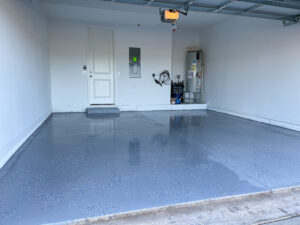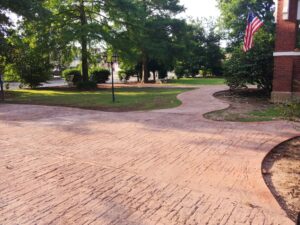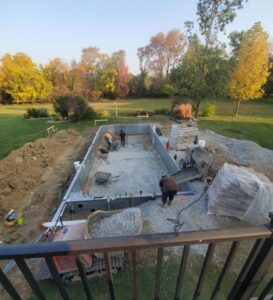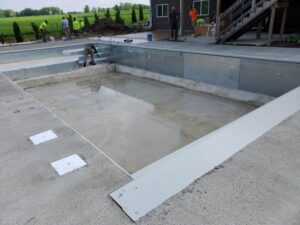Do you know you need an inground pool in your backyard, but that’s the extent of your pool knowledge? When starting this journey, you’ll probably have many questions, such as, “What is a gunite pool?” “How is it different from vinyl?” or “Can I work remotely from the comfort of my pool float?” While your boss can only answer that last question, Speck USA is here to help with all the details you need about different types of inground pools.
What Is a Gunite Pool and How Does it Differ from Concrete?
You might see the terms “gunite” and “concrete” used interchangeably when researching inground pools, but they are different. Gunite and concrete pools both involve excavating a large hole in the ground and installing a rebar frame to match the desired shape of the pool.
Concrete and gunite differ in how the mixture is combined and applied. Concrete comes pre-mixed in a concrete truck. For gunite, a dry cement mixture (with finer aggregates than concrete) is pumped through a large hose and combined with water right before being sprayed onto the rebar.
Why Is Gunite Superior to Concrete for Inground Pools?
Many professional pool contractors opt for gunite over concrete pools because it allows for increased flexibility. Concrete pools require workers to start the installation process and keep going until it’s finished. This is because layering new concrete over days old concrete can cause weak spots and cracks.
With gunite, on the other hand, the mixing and application process allows it to be sprayed on in stages without compromising the structural integrity.
In any case, the finished gunite or concrete is typically coated with plaster, pebbles, tiles, or another material to give the desired texture underfoot.
How Is Gunite Different from Vinyl Liners?
Vinyl liner pools start with a base known as “pool crete” on the bottom and wall panels made of plastic, aluminum, or steel on the sides. Then, a custom-fitted sheet of vinyl is clipped into a track along the pool’s edges. The result is an ultra-smooth pool surface that can be replaced every 10-15 years when it wears out.
Pros of Vinyl Liner Pools
Vinyl liner pools are less expensive upfront. Some people prefer the feeling of vinyl under their toes to plaster, pebbles, or tile. Another pro of vinyl liner pools is that they are quicker to build. Gunite can be installed in a few days, but it takes three to four weeks to cure.
Pros of Gunite Pools
While gunite pools are generally more expensive than vinyl liner pools, they do not require as much maintenance, and their durability will save you money over time. You won’t have to worry about wrinkling or surface punctures with gunite. Additionally, gunite pools allow for more customization and special features to be added to your pool design.
Who Is the Best Pool Builder in Des Moines?
The answer to this question is easy — it’s Speck USA! Experience means everything in this business, and we have been in the concrete industry for over five decades. Our gunite experts will give your family the quality, idyllic inground pool of your dreams. Contact us today to schedule your in-home consultation and discover the Speck USA difference.







